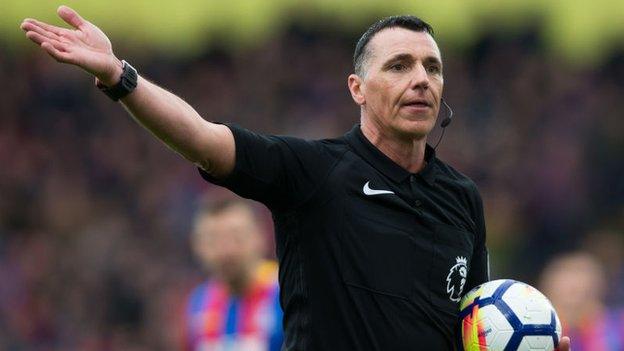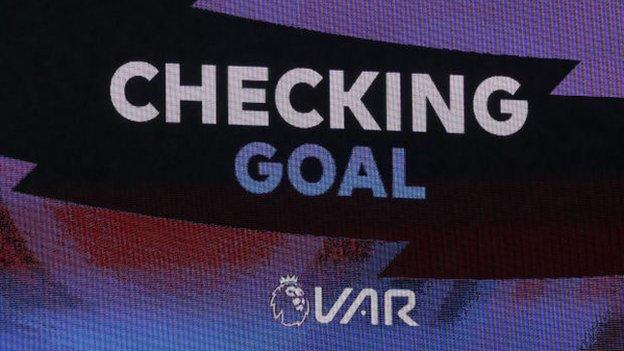VAR chief Neil Swarbrick marks new system as 'seven out of 10' despite criticism
- Published
- comments
VAR is where we expected it to be - Swarbrick
The use of video assistant referees (VAR) in Premier League games has been given a mark of seven out of 10 by the man in charge despite strong criticism.
Neil Swarbrick says VAR will evolve and asked for fans to be patient after another weekend of controversy.
Sheffield United had a goal ruled out for a marginal offside at Spurs while Manchester City saw two penalty appeals for handball turned down at Liverpool.
"I'm really pleased, honestly, with how we have started out," said Swarbrick.
VAR was introduced in the Premier League this season after trials in the Carabao Cup and FA Cup, but it has angered fans who cite inconsistencies in decision-making and say the time it takes for rulings to be made kills the passion and excitement of games.
Former Manchester City and England winger Trevor Sinclair , externalbelieves it is is damaging the Premier League's brand and reputation, and could even cause the best managers and players to leave.
Asked how he would rate the introduction of VAR out of 10, Swarbrick, the Premier League referees' lead on VAR, told BBC Sport: "I'd give us around about seven-ish.
"We have more decisions correct with VAR than without it. If the mark now is seven - early days - in two years' time I'm hoping for maybe a eight and a half or nine.
"We are open to evolving with this - it's not a case of we're not budging. We will listen to feedback and where we can improve things, we will do."
It is understood the accuracy of decision making around key incidents, such as goals, red cards and penalties, has increased from 82% last season to about 91% this term.

Swarbrick was a Premier League referee for seven years until 2018
Referees' chief Mike Riley is expected to give an update on how the introduction of VAR has gone in a briefing to all 20 top-flight clubs at a meeting in central London on Thursday.
"I'm comfortable with where we are but there's no doubt there's room for improvement. It's a work in progress," said Swarbrick.
BBC Match of the Day presenter Gary Lineker has suggested there should be a time limit of between 30 seconds and a minute for VAR decisions - otherwise, the time taken would indicate it is not a clear and obvious error which needs correcting.
"I can understand what he is saying but I don't think you can go down that line and say anything over a minute, we can't look at," he said.
"What would happen if you're coming to a decision after one minute and two seconds and it's the right decision but you're not taking the right decision because you're two seconds over."

In 120 Premier League games, there have been a total of around 800 checks - with 29 decisions overturned
How are referees dealing with the furore?
A weekend of Premier League action has yet to pass without VAR being debated by fans and trending on social media.
It is a tough job for officials but they are equipped to cope with the criticism, said Swarbrick.
"It's hard to put into words the pressure you feel as a VAR when you're behind the screen," he said.
"When we brought the media in for demonstrations, and we gave them clips to look at with no pressure on them to view these incidents, they said this is really hard.
"When I was refereeing there were incidents where the referee would get criticised. It's nothing new to us, it's part of our fabric, our make-up, it's what we're kind of used to and we are very resilient in that way.
"We take criticism on board. The criticism comes from people's opinions. I could look at an incident where I haven't given a penalty and be quite comfortable with that. Yet everyone could be criticising me. It's all about perspective."
Premier League stats on VAR
After 12 match rounds, there have been around 800 checks and 29 overturned decisions.
Average of around six checks per game, and an overturned decision once every four games.
The delay for an overturned decision is around one minute 15 seconds on average.
Average delay for a check is around 30 seconds.
Q&A: VAR chief on big talking points
Communication: Shown an example of a clear decision broadcast to players and fans in rugby union, he said: "It took rugby union six or seven years to get to that position. That doesn't happen overnight. You've just got to give us time."
Broadcasting decisions: Could fans watch or listen to VAR decisions, as in rugby or cricket? "You cannot use any referee communications like that because IFAB (football's lawmakers) protocols don't allow us to."
Offside: Swarbrick said the one-pixel lines used by VAR were magnified for TV broadcast which could make decisions seem more marginal than they are. "We are held by the laws of the game. Once we have made that decision with the lines, there's no interpretation, no tolerance band. It's either onside or offside."
Pitchside monitors: Referees in the Premier League have not tended to use the review screens. Will that change? "Quite possibly it will do. At the moment, the feedback we are getting back from the clubs, managers, players etc is they are quite comfortable in how we are operating."
'Seven out of 10? Are you serious?' - ex-players on VAR
Former Chelsea striker Chris Sutton has questioned Swarbrick's assessment of VAR's performance, saying there have been too many major mistakes for it to be considered a success.
"Seven out of 10? Did he really say that with a straight face? Come on, are you serious?" Sutton told BBC Radio 5 Live's Monday Night Club.
"There have been so many high-profile, horrific mistakes. They've got too much wrong.
"I wanted VAR to work, I backed VAR, but they are making such a mess of it."
Former Manchester City defender Micah Richards agreed, saying: "They've got major decisions wrong and they are hiding behind VAR.
"This all can be eradicated if the referee just goes and looks at the screen, they are making it a bigger problem than it actually needs to be.
"If the referee looks at the screen and it's his final decision, then you have to hold your hands up."
Former England goalkeeper Paul Robinson says VAR has been a "complete mess" and has not solved the problems it was supposed to.
"It's been a bit of a disaster. It's still a matter of opinion because it doesn't clear up a clear and obvious error; it's just someone else's opinion," Robinson told Radio 5 Live.
"There's a pecking order with referees. If you get a top referee making a decision, is the VAR willing to interfere with the senior referee's decision?
"It's been a complete mess from day one and it's caused more problems than what it's worth."